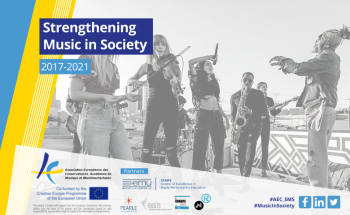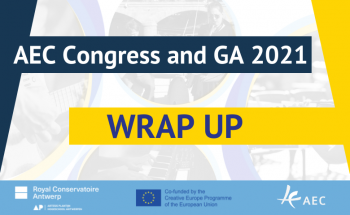Strand 1: Music’s and Music Higher Education Institutions’ (HEIs’) Role in Society
The working group examined concepts such as artistic citizenship, social responsibility and civic mission increasingly perceived to be relevant to the sector, and particularly explored their connections to concepts of artistic excellence, imagination and creativity, and musical heritage.
Objectives
- Raise consciousness of the contemporary potential and the contemporary challenges for musicians and for HMEIs in society.
- Explore how this potential and these challenges interact with the complex responsibilities that HMEIs have, artistically, educationally, economically, socially and environmentally.

Outputs
Musicians as “Makers in Society”: A Conceptual Foundation for Contemporary Professional Higher Music Education
An academic paper informed by research
This paper problematises the fundamental contemporary opportunities and challenges in making higher music education relevant, with an orientation towards the future of the music sector. It encourages institutions to rethink the nature of higher music education along these lines.
Through the paper, the WG calls for HMEIs to take ownership of the paradigm of musicians as “makers in society”, in order to support artists of the future and to renew the place of HMEIs.
The authors identify apparent dichotomies of value within contemporary higher music education, including between artistic and social purpose in the arts, between cultural heritage and new work, and between artistic imagination and cultural entrepreneurship. They argue that creative tensions between what have until now easily been perceived as opposing concepts or competing priorities need to be embraced. The paper, published in the Journal Frontiers in Psychology – Performance Science is addressed to students, staff and leaders in HMEIs as well as to representatives of the professional world and to policy makers.
The authors believe that working together in higher music education on this paradigm will be essential in the next years. They therefore encourage students, staff and leaders in HMEIs to reflect on the conceptual paradigm proposed and to foster discussion and critical debate with colleagues, sector networks, and locally with relevant communities and policy makers.
Watch the video explaining the academic paper
Annotated bibliography
A selective annotated bibliography related to the themes addressed by the SMS project.
The aim of the bibliography is to offer a powerful insight into existing writing and research, from various perspectives and disciplines, connected to the theme Strengthening Music in Society and to the central concepts explored by the working groups. The bibliography is meant for students, teachers, researchers and leaders in HMEIs who want to dig into the various themes addressed in more detail and find appropriate resources.
The bibliography offers 120 publications, consisting of books, articles and policy documents which the WG used during its explorations and discussions, arranged in alphabetical order and searchable via various thematic keywords (hashtags), such as “reflective practice”, “entrepreneurial mindset”, “interdisciplinarity”, etc. A short paragraph introduces each resource so that the users quickly understand its content and its target audience. The bibliography has been conceived as an open resource. Users are welcome to contact the AEC team and propose that a specific publication about the topic is added to the bibliography.
Working group members
- Helena Gaunt, Royal Welsh College of Music & Dance, Cardiff, United Kingdom (chair)
- Ana Čorić, University of Zagreb Academy of Music, Croatia
- Oleksandr Pryimenko, Kharkiv I.P. Kotlyarevsky National University of Arts, Ukraine
- Henrik Sveidahl, Rythmic Music Conservatory Copenhagen, Denmark
- Isabel Gonzalez Delgado, Conservatorio Superior de Murcia, Spain (student representative)
- Linda Messas, AEC Office, Brussels, Belgium (Working Group Coordinator)
More information? Get in touch with the Working Group Coordinator Linda Messas!







